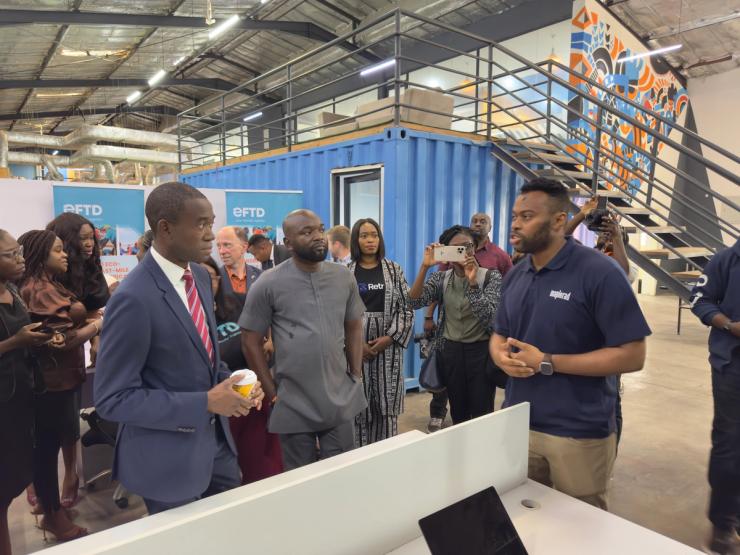The News
LAGOS — Speaking to business leaders and youth, U.S. Deputy Treasury Secretary Wally Adeyemo sought to assure Nigerians that President Joe Biden’s primary interest in their country was to be a partner in strengthening its economy.
Adeyemo, who is the highest-ranking Africa-born official in the Biden administration, told an audience at the Lagos Business School (LBS) on Monday that the U.S. believes an economically successful Nigeria is “important to the region, the continent, and the global economy.” After Adeyemo’s first stop at LBS he met executives from the banking and tech sectors. He also had a tour of Ogidi Studios, a recording studio in Lagos, and visited the premises of ReelFruit, an agribusiness company that has received $2 million in USAID funding.
He praised Nigerian president Bola Tinubu for “bold and difficult reforms” that have included ending a longstanding petrol subsidy and unifying forex rates, and for working with the Paris-based Financial Action Task Force on initiatives against money laundering and terrorism financing.
Tinubu touted those policy moves during his first address to the United Nations General Assembly a day later, also arguing that governments, global institutions and corporations should prioritize African development and bemoaning “broken promises, unfair treatment and outright exploitation from abroad.”
“Nigeria’s and Africa’s economic structures have been skewed to impede development, industrial expansion, job creation, and the equitable distribution of wealth,” Tinubu said. He would later ring the closing bell at the NASDAQ stock exchange on Wednesday.
In this article:
Alexander’s view
For some members of Nigeria’s business community, the visit of the Nigerian-born Adeyemo felt like a validation of their efforts despite harsh local economic conditions and an opportunity to vent frustration about some difficulties of doing business in the U.S., such as opening and operating bank accounts.
“Many companies that operate in Africa are domiciled in the United States, pay taxes in America and plan to list their companies on the New York Stock Exchange. This is a fantastic opportunity for trade between Nigeria and America,” said Ola Brown, a Nigerian investor, who joined a pre-selected group of startup entrepreneurs in a closed-doors roundtable discussion on Tuesday in Lagos.
Despite a still active political opposition to Tinubu from his rivals during the elections earlier this year (they are challenging an appeals court confirmation of Tinubu’s victory at the Supreme Court), the U.S. wants it to be clearly known that it is working with the Nigerian president towards “a strong relationship built on shared values and mutual benefit,” as Adeyemo put it.
Nigeria seemed to stand still within the international community during the past eight years of Muhammadu Buhari’s administration whose economic and political outlook hinged more on domestic self-sufficiency than global cooperation. While that may have been due to the urgency to win a protracted war against insurgents to the north, Nigeria ceded ground to Ghana, Kenya and South Africa whose leaders became leading voices of Africa’s aspirations on the global stage.
Nigeria remains challenged by various internal security crises including terrorism. Tinubu’s economic reforms have hit households hardest, while the naira currency has continued depreciating against the dollar. But the president is betting that a more globally active Nigeria will attract solutions to local problems that include an increasingly contagious anti-democracy wave coasting through close neighbors in West and Central Africa.
“The Tinubu Administration, like previous Nigerian governments, has taken advantage of international gatherings to leverage and share a new vision for the country,” said Afolabi Adekaiyaoja, a research analyst at the Center for Democracy and Development think tank in Abuja. “The question remains how much this approach can be sustained in the face of difficult and necessary domestic and foreign considerations.”
Room for Disagreement
Kingsley Moghalu, a former deputy governor of Nigeria’s central bank, said Tinubu’s administration would need to orient its outlook towards making government institutions independent if the country will invite renewed global attention.
“Nigerian economy is a long way from inspiring confidence in investors and the markets. As US Deputy Secretary of the Treasury Wale Adeyemo had noted, we simply do not as yet have the right macroeconomic framework to inspire such confidence,” Moghalu said on X. “A major challenge is governance outlook and processes, including the independence of institutions. From my experience this is perhaps the most critical element investors who move money around the world consider.”


